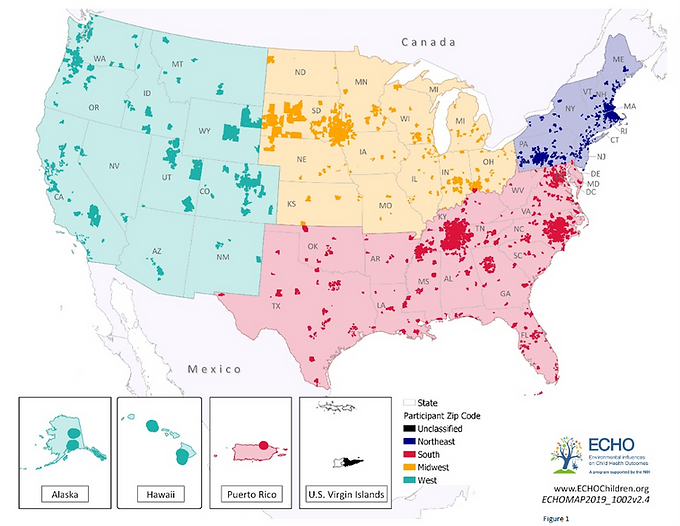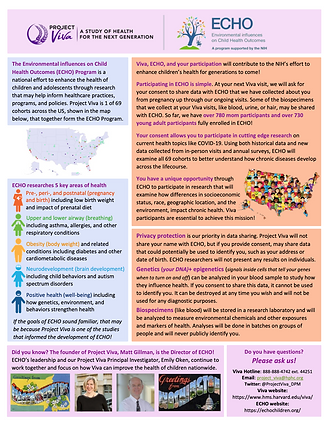The ECHO Program
In 2015, the United States National Institutes of Health (NIH) launched the Environmental influences on Child Health Outcomes (ECHO) Program to improve our understanding of how the environment affects child health and development. ECHO studies health effects of nutrition, chemicals, and the social and built environments (public parks, sidewalks, and other man-made physical surroundings) on children participating in 69 cohorts, or study populations, and their families, from across the country. You can visit the ECHO website for more information.
The ECHO Program has ambitious scientific/research goals that need participants like you.
ECHO amplifies the work that Project Viva has been doing for the last 20 years. Through its diverse 50,000 participant population, wide range of resources, and network of cohorts, ECHO can lead to discoveries that benefit mothers and children across the country. Project Viva contributes to ECHO’s greater scientific aims by our sharing of data and biospecimens as well as our collaboration of scientific ideas that generates publications and policies.
Project Viva collaborated with ECHO from 2017 to 2023. Although ECHO is not recruiting any new participants from Project Viva, they will continue to use the data from those who consented for future analyses and publications.

This image shows the different regions of the Unites States where study participants live.
Contact Us With Questions!
Study Hotline: 617-867-4251
Text: 617-553-6698
E-mail: project_viva@hphci.harvard.edu
ECHO Publications
Your participation in Project Viva and ECHO contributes to groundbreaking scientific research and discoveries. The following publications highlight research on topics where multiple ECHO researchers, including some from the Project Viva team, work together to share and study data to make new discoveries.
Visit the ECHO website to view even more publications on a wide range of topics!
ECHO Researchers investigate how the COVID-19 Pandemic Affected Children's Health Behaviors
Collaborative ECHO research led by Traci Bekelman, PhD, MPH of the University of Colorado, Anschutz Medical Campus investigates how the COVID-19 pandemic affected children’s diet, physical activity, screen time, and sleep. The study found that children’s screen time increased significantly during the pandemic with Hispanic children and non-Hispanic Black children having the most noticeable increase in screen time. The amount of time children spent asleep also increased, but only among children whose sleep time was below the recommended range before the pandemic. The study didn’t find any significant increase in the amounts of sugary drinks and unhealthy snack foods children consumed in the full study sample, but it did find a more noticeable increase among Hispanic children and older children.
This research, titled “Health Behavior Changes during the COVID-19 Pandemic: A Longitudinal Analysis among Children,” is published in the International Journal of Environmental Research and Public Health.
New ECHO Research Links Neighborhood Opportunity and Social Vulnerability to Children's Body Mass Index (BMI)
Childhood BMI—an estimation of their overall body fat—and childhood obesity are significant risk factors for cardiovascular disease-related morbidity and mortality later in adulthood. To understand how neighborhood-level conditions can affect a child’s risk for these health outcomes, this study looked at children from 54 ECHO cohorts located across the United States. ECHO researchers collected each child’s home address and weight at birth, infancy (6 months‒1.5 years), early childhood (2‒5 years), and mid-childhood (5‒10 years). The researchers linked children’s addresses throughout childhood to data from the Child Opportunity Index and Social Vulnerability Index to examine links between neighborhood conditions and children’s BMI and obesity over time.
New ECHO Study Finds Prenatal Antidepressant Use Does Not Increase Risk for Child Autism-Related Traits
Collaborative ECHO research led by Patricia Brennan, PhD of Emory University, investigates whether maternal prenatal antidepressant use affects a child’s risk for autism spectrum disorder (ASD) or autism-related traits. The study included over 3,000 mothers and their children and found no correlation between the use of antidepressants, including selective serotonin reuptake inhibitors (SSRIs), during pregnancy and child autism-related traits. This research, titled “Prenatal Antidepressant Exposures and Autism Spectrum Disorder or Traits: A Retrospective, Multi-Cohort Study,” is published in Research on Child and Adolescent Psychopathology.
ECHO Researchers Propose Eye-Tracking Technology Can Provide a Non-Biased, Cross-Cultural Tool for Assessing Attention Patterns in Young Children
Humans tend to give more attention to emotional information than neutral information. Past research indicates departures from this pattern typically occur in children with socially withdrawn behaviors. However, most of this research has been very limited and only conducted in controlled settings among primarily White children from urban areas.
In this study, ECHO researchers wanted to determine the extent to which two eye-tracking–based measures could be used cross-culturally to assess attention biases and how these biases might relate to socially withdrawn behaviors in children.

This image shows some of the focuses of ECHO research

